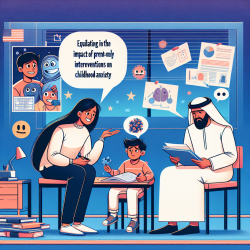Introduction
In the realm of speech-language pathology and online therapy services, evidence-based practice is paramount. For practitioners working with children and families affected by substance use, the recent study protocol for a randomized controlled trial (RCT) of the Parent–Child Assistance Program (PCAP) offers valuable insights. This blog will explore how practitioners can leverage the findings of this study to enhance their practice and improve outcomes for children and families.
Understanding the PCAP Study
The PCAP study is a comprehensive RCT designed to evaluate the effectiveness of a 3-year case management and home-visiting intervention for pregnant and postpartum individuals with at-risk substance use. The program aims to support recovery from substance use disorders (SUDs), enhance family well-being, and prevent future substance-exposed births. This trial is particularly significant as it addresses a critical gap in interventions for pregnant and parenting individuals with SUDs, a population that has been historically underserved.
Key Findings and Implications for Practice
The PCAP study is structured to assess both primary and secondary outcomes, including:
- Substance Use Disorder Recovery: The study aims to evaluate the impact of PCAP on SUD recovery, including treatment completion and duration of abstinence.
- Connection to Support Services: It examines the program's effectiveness in linking participants to recovery support services, which is crucial for sustained recovery.
- Family Preservation: The trial also assesses the program's role in preventing foster care placements and promoting family stability.
For practitioners, these findings underscore the importance of comprehensive, community-based interventions that address the multifaceted needs of families affected by substance use. By integrating case management and home-visiting services, practitioners can provide more holistic support, ultimately leading to better outcomes for children.
Encouraging Further Research
While the PCAP study provides a robust framework for intervention, it also highlights the need for ongoing research. Practitioners are encouraged to consider the following:
- Data Collection and Analysis: Engage in systematic data collection to track the progress and outcomes of interventions, contributing to the evidence base.
- Collaboration with Researchers: Partner with academic institutions to participate in research studies, ensuring that practice informs research and vice versa.
- Continuous Professional Development: Stay informed about the latest research findings and incorporate them into practice to enhance service delivery.
Conclusion
The PCAP study represents a significant step forward in addressing the needs of families affected by substance use. By implementing the study's findings and engaging in further research, practitioners can play a crucial role in improving outcomes for children and families. To read the original research paper, please follow this link: Study protocol for a randomized controlled trial of the Parent–Child Assistance Program: a case management and home visiting program for people using substances during pregnancy.










